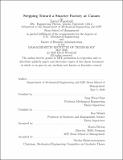Stepping toward a smarter factory at Canam
Author(s)
Woodruff, David(David T.)
Download1191223861-MIT.pdf (5.252Mb)
Other Contributors
Sloan School of Management.
Massachusetts Institute of Technology. Department of Mechanical Engineering.
Leaders for Global Operations Program.
Advisor
Jung Hoon-Chun and Roy Welsch.
Terms of use
Metadata
Show full item recordAbstract
Canam Group ("Canam") is a manufacturer of steel components and building products used in the construction industry. The company uses a distributed network of manufacturing centers throughout North America to build and ship joist and deck product to its customers. Each manufacturing center utilizes a similar set of equipment assets in the production process. Equipment assets are not connected to a data collection system capable of monitoring their performance and health. As a result, comparing the performance of similar equipment across sites is a challenge for the organization. The motivation for this thesis is to determine how Internet of Things (IIoT) technologies can be applied to an industrial business like Canam to improve asset monitoring capabilities. An experimental approach is used to demonstrate how IIoT frameworks discussed in literature can be employed in practice. In the first experiment, a network connectivity audit is performed to answer a set of practical questions about data communication within an industrial machine network. In the second experiment, a commercial tool is deployed at a specific equipment asset and integrated into the production workflow to collect data about the performance of the equipment. Downtime data collected from the IIoT tool deployed in the experimentation phase is compared with data collected using an existing manual data collection process. The data collected from the IIoT device revealed a systematic under-reporting of downtime in the manual process. Machine availability was shown to be 46% as compared to 90% recorded in the manual process. A model is presented to demonstrate that improving availability of critical equipment could lead to a 6% increase in plant throughput. The thesis concludes by combining the findings of the experimental results and literature review to develop a framework from which the business can establish an organizational vision for IIoT, an implementation plan, a project scoping methodology and vendor selection criteria..
Description
Thesis: M.B.A., Massachusetts Institute of Technology, Sloan School of Management, in conjunction with the Leaders for Global Operations Program at MIT, May, 2020 Thesis: S.M., Massachusetts Institute of Technology, Department of Mechanical Engineering, in conjunction with the Leaders for Global Operations Program at MIT, May, 2020 Cataloged from the official PDF of thesis. Includes bibliographical references (pages 129-130).
Date issued
2020Department
Sloan School of Management; Massachusetts Institute of Technology. Department of Mechanical Engineering; Leaders for Global Operations ProgramPublisher
Massachusetts Institute of Technology
Keywords
Sloan School of Management., Mechanical Engineering., Leaders for Global Operations Program.